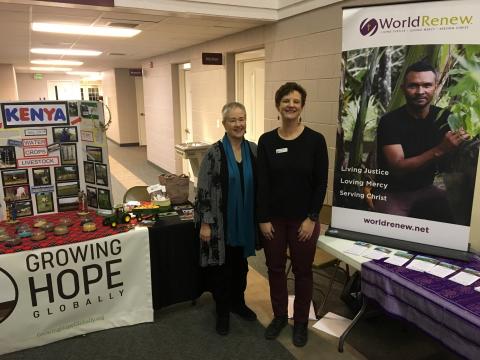
Laurie Kaniarz of Growing Hope Globally and Wendy Hammond from World Renew at the display of nativity sets at Friendship CRC.
Warm-hearted giving from a Christian Reformed congregation in West Michigan will help to fund development projects across the globe and, specifically, a new effort in Kenya to protect girls from female circumcision.
The money was raised from a recent display and sale of nativity sets and other goods at Friendship Christian Reformed Church in Byron Center, Mich.. Funds went to support Growing Hope Globally(formerly Foods Resource Bank), a partner of World Renew that funds agricultural projects in several countries.
Funds from the nativity-scene event — along with a donation from Friendship’s Coffee Break group — also went to pay for a gathering of young girls at Christmas in a church in the Rift Valley of Kenya.
The girls are Maasai tribe members who Ann Mopel, herself a Maasai, has rescued from having to undergo such tribal initiation rites as female genital mutilation, which the World Health Organization considers a human rights violation.
Mopel runs EMADO, a development organization that helps to protect young girls and provides them with opportunities to break away from tribal traditions through education and other means.
“I am so deeply humbled by Ann and the work she is doing,” said Bev Abma, a Friendship member who first met Mopel in 2013 while serving as overseas director for Growing Hope Globally. Mopel was working for the Mennonite Central Committee at the time.
“Ann is a pastor and committed Christian with a deep concern for her people and especially in helping those young women who are facing female circumcision” — a procedure that Mopel herself experienced.
Hailing from around the world, some 90 nativity sets were displayed recently at Friendship to highlight the story of Christ being born in a stable and to raise money for Mopel and Growing Hope Globally.
Among the sets were ones Abma obtained during her travels. Rev. Joel Boot, interim pastor of Friendship and former executive director of the CRC, also brought some of his nativity sets.
“I have collected crèches for almost 50 years. I enjoy the different emphases and slants on the one story that figures from many lands and places offer. Our house is full of them, and, all told, I have about 60-plus crèches around the house during December,” he said.
Boot also is aware of Friendship’s ongoing ties with the people of Kenya.
“Every year a group of people, many (if not most) of them from Friendship, go to Kenya, and there is talk of setting up a sister-church relationship with one of the local churches there. All of that is spearheaded by Bev, and she is currently enlisting folks for next year’s trip in August.”
Wendy Hammond, church relations manager for World Renew in the U.S., was on hand during the two-day display of nativity scenes to discuss the ties between World Renew and Growing Hope Globally and to offer information on the work of World Renew. She also took in the nativity scenes from around the world.
“My favorites included one made of Michigan driftwood and one from Mali that included women bearing gifts of fruit, firewood, and water. But perhaps the most sobering was the one from Israel/Palestine that showed the wall that now separates Bethlehem from Jerusalem. It was a good reminder to pray for peace on earth.”
With the donations to EMADO, Mopel will be able to purchase school uniforms as Christmas presents for more than 40 girls. Without uniforms they can’t attend school.
“Education is crucial for these girls. By becoming educated, they can find work and not be ‘one more mouth to feed’ for their families,” said Abma.
Traditional Maasai rites of passage for young girls are performed to make the girls ready for marriage in which a man can step in to take on the responsibility of caring for them, said Abma.
Abma has taken on the task of finding support for Mopel on her own. The work has touched her heart, and she has helped the Maasai pastor write a story about her life, begun in earnest earlier this year when Abma and her friend, Beth Mooy, visited Kenya.
“Ann is working tirelessly with families and girls (recently adding boys), teaching the dangers of the procedure [female genital mutilation] and also explaining that there are opportunities for girls who stay in school,” said Mooy. “Ann realized that her own story needed to be told to help her people change.”
In the story titled “On Becoming a Maasai Woman,” Mopel writes of attending school through sixth grade, which helped her to avoid undergoing the initial initiation rites that take place before female circumcision.
She escaped, Mopel said, “the removal of two frontal lower teeth with a knife at age six, then ear piercing at age nine, and then razor tattooing of the abdomen and decorating the thighs to show bravery.”
When it came time for circumcision, she “planned to escape by sneaking away two days before the cut was to happen. Unfortunately, a few of the girls told their mothers, who in turn told my mother.”
Aware of their daughter’s plan, her parents scheduled the procedure before she could escape. An older woman excised most of her genitalia using the traditional Olmoronya, a thin, axe-shaped piece of metal.
The experience was horrible, said Mopel, who lost blood, became unconscious, and had to be taken to a nearby clinic where she regained consciousness, stayed for a few days, and returned home.
“My wound took longer to heal than did those of my friends: my parents said that was probably because I was the oldest of the girls,” she said.
Because she was then considered suitable for marriage, a 60-year-old man asked for her to be his fifth wife, and, after meeting him, she decided to run away to live with one of her grandmothers. Eventually she returned home and married another man who is Maasai.
She and her husband have refused to have their four daughters circumcised, and this has made the entire family outcasts. But, in the process, Ann became a pastor and began her mission to rescue girls and find homes for them. Eventually she hopes to build a safe house in which as many as 50 girls can live.
“Thirteen of us have formed EMADO, registered in 2016 to lead this work. With the Lord’s grace, we have the courage to raise our voices and be heard on behalf of women and young girls not only in my community but everywhere.”
Mopel told Abma that she is very grateful for the donations from Friendship. They will hand out the school uniforms at the Christmas celebration in a church in the town of Najili.
“We are happy to be able to support Ann and these girls who are saying ‘no’ to female genital mutilation and ‘yes’ to school,” said Abma. “We’ll continue to support Ann as she works to replace female circumcision with positive rites of passage.”

